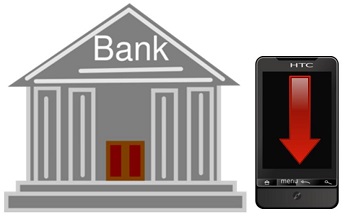Mobile payments are evolving and many banks may be in danger of getting left behind by consumers
The mobile payments space is evolving at a rapid pace and banks are struggling to keep up. Innovative mobile services appear to be launching on a daily basis and many of these services are changing the way people pay for products online and in the real world. Those finding the most success in this field are those outside of the financial service industry, but banks still have a chance to establish a stronger presence in the mobile commerce market.
Rapid adoption of mobile payment services highlights the slow progress banks have made
The rapid adoption of mobile commerce among consumers is pressuring banks to become more mobile-centric. Money transfers are becoming more common on mobile platforms and fewer people are relying on banks for their financial needs. Moreover, those participating in mobile commerce are making use of platforms developed by software firms and not those made by banks. Typically, the platforms developed by banks are seen as cumbersome and somewhat inconvenient to use regularly.
Many banks have an opportunity to engage mobile consumers through simple services
 Banks have existed as the primary money service provider for years. As such, many people still look to banks for the financial institutions that they are and many have faith in their bank’s ability to provide attractive mobile services. Some banks have found success in engaging mobile consumers through the use of simple banking applications. These apps have served as a way for banks to expose themselves to the mobile spectrum and examine what mobile consumers are interested in and what types of services they do not like.
Banks have existed as the primary money service provider for years. As such, many people still look to banks for the financial institutions that they are and many have faith in their bank’s ability to provide attractive mobile services. Some banks have found success in engaging mobile consumers through the use of simple banking applications. These apps have served as a way for banks to expose themselves to the mobile spectrum and examine what mobile consumers are interested in and what types of services they do not like.
Some banks may have to emulate companies like PayPal that have had success in engaging a mobile audience
In order for traditional banks to remain relevant in a world where mobile technology is becoming a dominant force, they will have to find ways to mimic other financial service providers that have an overarching focus on the digital space. PayPal is a primary exemplar of what can be accomplished through an unconventional focus on the mobile space.

 Beyond the format war, other issue exist that continue to make mobile commerce a complicated matter. Large companies are beginning to muscle their way into the mobile scene, hoping to take advantage of the growing popularity of mobile payments. Companies like AT&T, Verizon Wireless, Google, and others have launched
Beyond the format war, other issue exist that continue to make mobile commerce a complicated matter. Large companies are beginning to muscle their way into the mobile scene, hoping to take advantage of the growing popularity of mobile payments. Companies like AT&T, Verizon Wireless, Google, and others have launched 